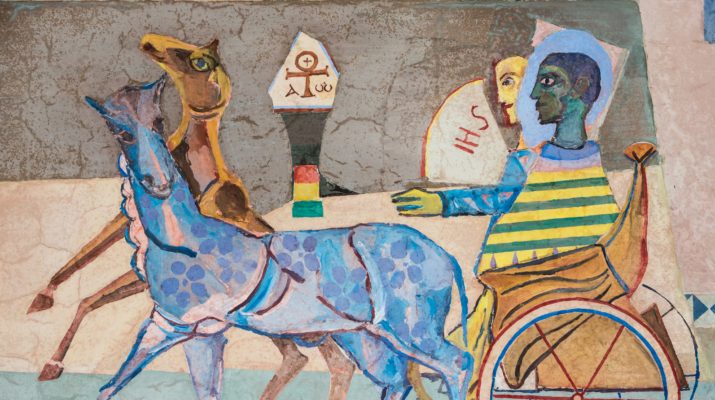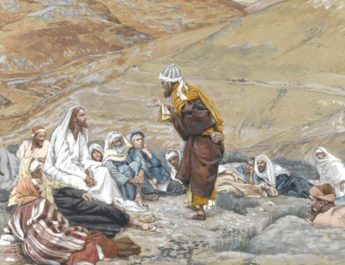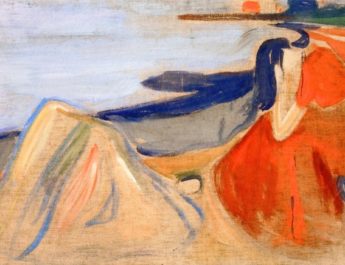Acts 8:26-39
Narrative Lectionary 342
26 Then an angelA of the LordB said to Philip,C
A “angel” = aggelos. Probably from ago (to lead, bring, carry, guide) + agele (flock, herd, drove); {also from ago (see above)}. This is angel or messenger. Properly, it is one sent with news or to perform a specific task. This messenger can be human or an angel from heaven. More commonly, it is used for angels in the New Testament.
B “Lord” = kurios. From kuros (authority, supremacy). This is a respectful address meaning master or sir. It refers to one who has control or power greater than one’s own. So, it was also applied to God and Jesus as Master or Lord.
C “Philip” = Philippos. From philos (dear, beloved, a friend, an associate; friendship with personal affection, a trusted confidante; love from personal experience with another person) + hippos (horse). This is Philip, meaning one who loves horses or is fond of horses.
“Get upD and goE toward the southF to the roadG
D “get up” = anistemi. From ana (upwards, up, again, back, anew) + histemi (to make to stand, place, set up, establish, appoint, stand by, stand still, stand ready, stand firm, be steadfast). This is to raise up, rise, appear. It is to stand up literally or figuratively. Can also mean to resurrect.
E “go” = poreuomai. From poros (ford, passageway). This is to go, travel, journey, or die. It refers to transporting things from one place to another and focuses on the personal significance of the destination.
F “south” = mesembria. 2x in NT. From mesos (middle, among, center); {perhaps from meta (with among, behind, beyond; implies a change following contact or action)} + hemera (day, time, daybreak); {perhaps from hemai (to sit)}. This is literally midday or the south.
G “road” = hodos. This is way, road, path, or journey. It can imply progress along a route.
that goes downH from JerusalemI to Gaza.”J (This is a wildernessK road.)
H “goes down” = katabaino. From kata (down, against, throughout, among) + baino (to walk, go). This is to come down whether from the sky to the ground or from higher ground to lower. It can be used in a literal or figurative sense.
I “Jerusalem” = Ierousalem. From Hebrew yerushalaim (probably foundation of peace); {from yarah (to throw, shoot, be stunned; to flow as water so figuratively to instruct or teach) + shalem (to make amends, to be complete or sound)}. This is Jerusalem, dwelling of peace.
J “Gaza” = Gaza. 1x in NT. From Hebrew Azzah (Azzah, Gaza; a city meaning “strong”); from az (strong or mighty; power, vehemence, greedy); from azaz (to be strong, become fixed, be bold, prevail, be impudent; it means to be stout literally or figuratively. A Late Hebrew word). This is Gaza, meaning “strong,” a city of the Philistines.
K “wilderness” = eremos. Properly, a place that is not settled or farmed, not populated. It could be a deserted area or a desert place. It could be seen as secluded, solitary, or lonesome. Any kind of vegetation is sparse, but so are people generally.
27 So he got up and went. NowL there wasM an EthiopianN eunuch,O
L {untranslated} = idou. From eido (to be aware, see, know, remember, appreciate). This is see! Lo! Behold! Look! Used to express surprise and or draw attention to the statement.
M {untranslated} = aner. This is man, male, husband, or fellow. It can also refer to an individual.
N “Ethiopian” = Aithiops. 2x in NT. Perhaps from aitho (to burn, scorch) + ops (eye, face); {from optanomai (to appear, be seen)}. This is Ethiopian or Abyssinian, perhaps meaning, “burned face” or “Land of black people.” See https://en.wiktionary.org/wiki/%CE%91%E1%BC%B0%CE%B8%CE%B9%CE%BF%CF%80%CE%AF%CE%B1#Ancient_Greek
O “eunuch” = eunouchos. 8x in NT. From eune (bed) + echo (to have, hold, possess). This is a eunuch – one who keeps the bed-chamber or chooses not to marry. Literally, it can refer to one who is castrated.
a court officialP of the Candace,Q queenR of the Ethiopians, in charge of her entire treasury.S He had come to Jerusalem to worshipT
P “court official” = dunastes. 3x in NT. From dunamai (to be able, have power or ability). This is ruler, powerful, or court official. It is someone who has power and authority or, by extension, someone in the royal court.
Q “Candace” = Kandake. 1x in NT. From Meroitic kdke (Candace, a title for the queen). This is Candace, a name used for the Ethiopian queen. It may mean “queen” in its own right. See https://en.wiktionary.org/wiki/Candace#English
R “queen” = basilissa. Related to “goes down” in v26. 4x in NT. From basileus (king, emperor, sovereign); probably from basis (step, hence foot; a pace); from baino (see note H above). This is queen.
S “treasury” = gaza. 1x in NT. From Persian – origin uncertain. This is treasury or riches.
T “worship” = proskuneo. From pros (advantageous for, at, to, toward, with) + kuneo (to kiss); {may be related to kuno (dog)}. This is to do reverence, kneel, to prostrate oneself in homage, to worship.
28 and was returning home; seatedU in his chariot,V he was readingW the prophetX Isaiah.Y
U “seated” = kathemai. Related to “south” in v26. From kata (down, against, throughout, among) + hemai (see note F above). This is to sit, be enthroned, or reside.
V “chariot” = harma. 4x in NT. Perhaps from airo (raise, take up, lift, remove). This is a chariot or other vehicle.
W “reading” = anaginosko. From ana (upwards, up, again, back, anew) + ginosko (know, recognize, learn from firsthand experience). This is literally to know again – to recognize, read, or discern.
X “prophet” = prophetes. From pro (before, in front of, earlier than) + phemi (to declare, say, use contrasts in speaking to shed light on one point of view); {from phao (to shine) or phaino (to bring light, cause to appear, shine, become visible or clear)}. This is a prophet or poet – one who speaks with inspiration from God.
Y “Isaiah” = Esaias. From Hebrew Yeshayahu (Isaiah, “salvation of the Lord”); {from yasha (to deliver, defend, help, preserve, rescue; properly, to be open, wide or free, which implies being safe; to free someone) + Yah (the shortened form of the name of the God of Israel; God, Lord); {from YHVH (proper name of the God of Israel; God, Lord; the self-existent or eternal one); from havah (to become) or hayah (to be, become, happen)}}. This is Isaiah, meaning “salvation of the Lord.”
29 Then the SpiritZ said to Philip, “Go overAA to this chariot and joinBB it.”
Z “Spirit” = Pneuma. From pneo (to blow, breath, breathe hard). This is wind, breath, or ghost. A breeze or a blast or air, a breath. Figuratively used for a spirit, the human soul or part of us that is rational. It is also used supernaturally for angels, demons, God, and the Holy Spirit. This is where pneumonia comes from.
AA “go over” = proserchomai. From pros (for, at, towards) + erchomai (to come, go). This is to approach, draw near, come up to. It is also used figuratively to mean worship.
BB “join” = kollao. 12x in NT. From kolla (glue). This is to glue together. So it is joining, spending time with, or being intimately connected to. It can be used for marriage, joining the church, clinging, or adhering to something. It was also used medically for uniting wounds.
30 So Philip ran upCC to it and heardDD him reading the prophet Isaiah. He asked, “Do you understandEE what you are reading?”
CC “ran up” = prostrecho. 3x in NT. From pros (at, to, toward, with) + trecho (to run, make progress, rush; running like an athlete in a race; figuratively, to work quickly towards a goal in a focused way). This is to run towards in order to join.
DD “heard” = akouo. This is hear or listen, but it also means to understand by hearing. This is where the word “acoustics” comes from.
EE “understand” = ginosko. Related to “reading” in v28. See note W above.
31 He replied, “How canFF I, unless someone guidesGG me?” And he invitedHH Philip to get inII and sitJJ beside him.
FF “can” = dunamai. Related to “court official” in v27. See note P above.
GG “guides” = hodegeo. Related to “angel” and “road” in v26. 5x in NT. From hodegos (leader, guide; figuratively, a teacher); {from hodos (see note G above) + hegeomai (to think, suppose, have an opinion; to lead the way, what comes in front or first, initial thought, high esteem or authority; one who commands in an official capacity); {from ago (see note A above)}. This is to lead, guide, teach. It is to show someone the path they should take, whether literal or figurative.
HH “invited” = parakaleo. From para (beside, by, in the presence of) + kaleo (to call by name, invite, to name, bid, summon, call aloud) {related to keleuo (to command, order, direct); from kelomai (to urge on)}. This is to call to, summon, invite, request, or beg. It can also be exhort or admonish. Also, this can be encourage, comfort, or console. This word has legal overtones and is used of one’s advocate in a courtroom. It is the root of the name of the Holy Spirit “paraclete” is our advocate and comforter.
II “get in” = anabaino. Related to “goes down” in v26 & “queen” in v27. From ana (up, back, among, again, anew) + the same as basis (see note R above). This is to come up in a literal or figurative sense – ascent, rise, climb, enter.
JJ “sit” = kathizo. From kathezomai (to sit down, be seated); {from kata (down, against, according to, among) + hezomai (to sit); {from aphedron (a seat, a base)}}. This is to sit, set, appoint, stay, rest.
32 Now the passageKK of the scriptureLL that he was reading was this:
“Like a sheepMM he was ledNN to the slaughter,OO
KK “passage” = perioche. Related to “eunuch” in v27. 1x in NT. From periecho (to surround, encompass, completely contain, include); {from peri (about, concerning, around, encompassing) + echo (see note O above)}. This is a circumference – a specific section of scripture, a place.
LL “scripture” = graphe. From grapho (to write). This is literally writing, a document. In the New Testament, this is always used for scripture.
MM “sheep” = probaton. Related to “goes down” in v26 & “queen” in v27 & “get in” in v31. Probably from probaino (to go forward literally or to advance in years); {from pro (before, ahead, earlier than, above) + the same as basis (see note R above)}. This is literally easily led and so a sheep or another grazing animal. Also use figuratively of people who are led easily.
NN “led” = ago. Related to “angel” in v26 & “guides” in v31. See note A above.
OO “slaughter” = sphage. 3x in NT. From sphazo (to slay, butcher an animal to eat or for sacrifice, slaughter, maim through violence). This is butchery of meat, whether for sacrifice or for food. It can also be used of slaughter and sacrifice more generally and figuratively of people, meaning destruction.
and like a lambPP silentQQ before its shearer,
so he does not openRR his mouth.SS
PP “lamb” = amnos. 4x in NT. This is lamb, used figuratively for innocence or in reference to its sacrificial use. Usually, it refers to a lamb that is one year old.
QQ “silent” = aphonos. Related to “prophet” in v28. 4x in NT. From a (not, without) + phone (voice, sound, tone or noise; also a language or dialect); probably from phemi (see note X above) or phaino (see note X above)}}. This is without voice, silent, meaningless.
RR “open” = anoigo. From ana (up, back, again, among, between, anew) + oigo (to open). This is to open in literal or figurative sense.
SS “mouth” = stoma. Perhaps from tomoteros (sharp, keener); from temno (to cut). This is mouth, speech, language, the tip of a sword, an opening in the ground.
33 In his humiliationTT justiceUU was deniedVV him.
Who can describeWW his generation?XX
TT “humiliation” = tapeinosis. 4x in NT– in Luke 1:48 in the Magnificat “God has looked with favor on the lowliness of God’s servant.” From tapeinoo (bringing someone or something low; figuratively to humble or humiliate – to depress or abase); from tapeinos (low in position, depressed, low in circumstance; fig humiliated, low in spirit). This is humiliation, lowliness, low state, depression.
UU “justice” = krisis. From krino (to judge, decide, think good, condemn, determine, pass judgment, stand trial, sue; judging whether in court or in a private setting; properly, mentally separating or distinguishing an issue – to come to a choice or decision, to judge positively or negatively in seeking what is right or wrong, who is innocent or guilty; can imply trying, condemning, punishing, or avenging). This is a judging or a sentence. It is often used of God’s judgment, but can also be any accusation or condemnation. This is where the word “crisis” comes from.
VV “denied” = airo. Perhaps related to “chariot” in v28 & {untranslated} in v30. See note V above.
WW “describe” = diegeomai. Related to “angel” in v26 & “guides” in v31 & “led” in v32. 8x in NT. From dia (through, because of, across, thoroughly) + hegeomai (see note GG above). This is to describe fully, narrate, declare, tell something clearly so that one knows what is most important.
XX “generation” = genea. From genos (family, offspring, kin – in a literal or figurative sense); from ginomai (to come into being, to happen, become, be born; to emerge from one state or condition to another; this is coming into being with the sense of movement or growth). This is family, generation, kind, or nation. As generation, it implies an age as a period of time. It can also mean infinity. This is the root of the word “generation.
For his lifeYY is taken awayZZ from the earth.”AAA
YY “life” = zoe. From zao (to live, be alive). This is life including the vitality of humans, plants, and animals – it is life physical and spiritual and life everlasting.
ZZ “taken away” = airo. Same as “denied” in v33. See note VV above.
AAA “earth” = ge. This is earth, land, soil, region, country, the inhabitants of an area.
34 The eunuch asked Philip, “About whom, may I askBBB you, does the prophet say this, about himself or about someone else?”CCC
35 Then Philip began to speak,DDD and startingEEE with this scripture, he proclaimed to him the good newsFFF about Jesus.GGG
BBB “ask” = deomai. From deo (to tie, bind, fasten, impel, compel; to declare something against the law or prohibited) This is having an urgent need because one is missing or needing something so it is an earnest appeal or pressing request.
CCC “else” = heteros. This is other, another, different, strange. It is another of a different kind in contrast to the Greek word allos, which is another of the same kind. This could be a different quality, type, or group.
DDD “began to speak” = anoigo + de + ho + Philippos + ho + stoma + autos. Literally “opened then Philip his mouth.” Anoigo is the same as “open” in v32. See note RR above.
EEE “starting” = archomai. From archo (to rule, begin, have first rank or have political power). This is to begin or rule.
FFF “proclaimed…the good news” = euaggelizo. Related to “angel” in v26 & “guides” in v31 & “led” in v32 & “describe” in v33. From eu (well, good, rightly) + aggelos (see note A above). This is evangelize – literally to preach the good news. It can be those who hear the news, the news, or a way to say gospel.
GGG “Jesus” = Iesous. Related to “Isaiah” in v28. From Hebrew Yehoshua (Joshua, the Lord is salvation); {from YHVH (see note Y above) + yasha (see note Y above)}. This is Jesus or Joshua in Greek – the Lord saves or the Lord is salvation.
36 As they were going along the road, they came to some water; and the eunuch said,HHH “Look,III here is water! What is to preventJJJ me from being baptized?”KKK
HHH “said” = phemi. Related to “prophet” in v28 & “silent” in v32. See note X above.
III “look” = idou. Same as {untranslated} in v27. See note L above.
JJJ “prevent” = koluo. Perhaps from the same as kolazo (to punish, particularly to punish slaves so that they are restricted or chastised); from kolos (docked, dwarf). This is to hinder or prevent, restrain, refuse. It can be prevent, whether through words or actions.
KKK “baptized” = baptizo. From bapto (to dip or dye; to entirely cover with liquid, to stain). This is to submerge, wash, or immerse. Used specially for baptism.
37 And Philip said, “If you believeLLL with allMMM your heart,NNN you may.”OOO And he replied, “I believe that Jesus ChristPPP is the Son of God.”QQQ
LLL “believe” = pisteuo. From pistis (faith, faithfulness, belief, trust, confidence; to be persuaded or come to trust); from peitho (to have confidence, urge, be persuaded, agree, assure, believe, have confidence, trust). This is to believe, entrust, have faith it, affirm, have confidence in. This is less to do with a series of beliefs or doctrines that one believes and more to do with faithfulness, loyalty, and fidelity. It is trusting and then acting based on that trust.
MMM “all” = holos. This is whole, complete, or entire. It is a state where every member is present and functioning in concert. This is the root of the word “whole.”
NNN “heart” = kardia. Literally the heart, but figuratively mind, character, inner self, will, intention, thoughts, feelings. Also, the center of something. The word heart is only used figuratively in the Old and New Testaments. This is where “cardiac” comes from.
OOO “may” = exesti. From ek (out, out of) + eimi (to be, exist). This is what is permitted or what is allowed under the law. It can mean what is right, what holds moral authority, or, more broadly, something that is shown out in public.
PPP “Christ” = Christos. From chrio (consecrate by anointing with oil; often done for prophets, priests, or kings). Literally, the anointed one, Christ. The Greek word for Messiah.
QQQ “God” = Theos. From Proto-Indo-European origins, meaning do, put, place. This is God or a god in general.
38 He commandedRRR the chariot to stop,SSS and both of them, Philip and the eunuch, went down into the water, and Philip baptized him. 39 When they came upTTT out of the water, the Spirit of the Lord snatched Philip away;UUU the eunuch sawVVV him no more, and went on his wayWWW rejoicing.XXX
RRR “commanded” = keleuo. From kelomai (to urge on). This is to command, order, or direct.
SSS “stop” = histemi. Related to “get up” in v26. See note D above.
TTT “came up” = anabaino. Same as “get in” in v31. See note II above.
UUU “snatched…away” = harpazo. Perhaps related to “chariot” in v28 & “denied” in v33. 14x in NT. Perhaps from haireomai (to choose, take); probably related to airo (see note V above). This is to grab with force, seize, pluck, get through robbery, snatch up. This is taking something openly and violently – not subtly or in secret.
VVV “saw” = horao. To see, perceive, attend to, look upon, experience. Properly, to stare at and so implying clear discernment. This, by extension, would indicate attending to what was seen and learned. This is to see, often with a metaphorical sense. Can include inward spiritual seeing.
WWW “way” = hodos. Same as “road” in v26. See note G above.
XXX “rejoicing” = chairo. From char– (to extend favor, lean towards, be inclined to be favorable towards). This is to rejoice, be glad or cheerful; a greeting. This is the root verb that the Greek word for “grace” comes from (charis).
Image credit: “Fresco of the Seckau Apocalypse by Herbert Boeckl (1952 – 1960) in the Angel’s Chapel at Seckau Abbey, Styria, Austria: Philip and the Ethiopian Eunuch”




